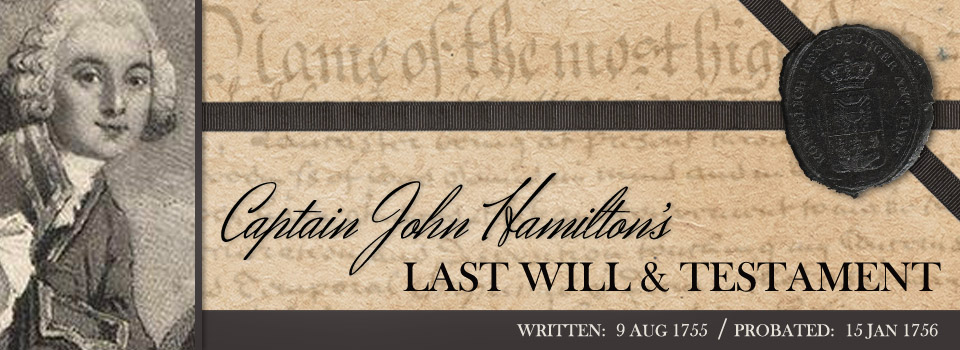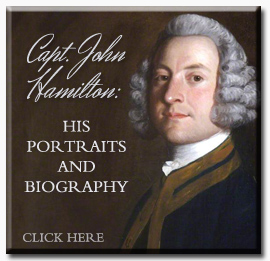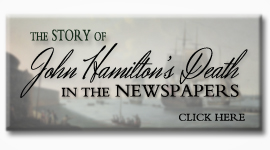Last Will and Testament of Captain John Hamilton
IN THE NAME OF THE MOST HIGH GOD, AMEN. I, John Hamilton, Mariner, Captain of His Majesty's Ship, Lancaster, being at present, through the unmerited goodness of God, sound in mind and in admirable health of body, have judged it fit and covenient to make the following declaration and disposition touching my concerns, spiritual and temporal.
Imprimis. I declare that, as I have lived so by God's help and grace, I hope to die in the communion of the Church of England, as by law established, and that through the especial grace and favour of God I have the joy and comfort to feel myself in love and charity with all mankind. I humbly yet aspiringly commend my soul in the merciful hands of Him who gave it, trusting in the merits and sacrifice and medication of my dear and blessed Redeemer Jesus Christ as a full atonement and satisfaction for the deep and manifold transgressions wherewith I have, from time to time, so grievously offended my heavenly Father, in thought, word and deed.
My body I consign indifferently to all or any of the four elements appointed to receive and keep it until the great and tremendous day of Account, making it my earnest request and, as far as in me lies, insisting that if I have a Christian burial it may be performed (as a Christian burial ought to be) without any the least pomp, ceremony or expence more than shall be absolutely necessary. I do, therefore, peremptorily limit the expences and charge of my interment to ten pounds, a sum abundantly more than sufficient to provide a repository for my poor mortal exuvia and preserve them inoffensive to my survivors. Correspondently hereunto, my farther desire is that, in due observance of the laws of my country, those perishable remains of me may be shrouded in woolen.
And now, as touching the worldly goods and possessions wherewith it hath pleased the munificent Lord of the Universe to bless and endow me.
Item. I give and bequeath unto my right Dear and Honoured Mother, the Countess of Abercorn; to the much loved and respected Mother of my beloved Wife, Mrs. Esther Booth; to my two Dear Brothers, the Earl of Abercorn, and the Honourable and Reverend Mr. George Hamilton, rector of Taplow; to my Dear and Honoured uncle, William Plumer, esquire; to my Dear and much Esteemed cousin, the Lady Cathcart; to my respected uncle, the Honourable Charles Hamilton, esquire; to my Dear Kinsman and approved friend, Robert Nugent of Gosfield, esquire; and to my worthy and well beloved friend, Pendock Neale of Tollerton in the county of Nottingham, esquire; to every and each of them that shall be living at the time of my death, the sum of twenty one pounds, to be laid out in a neat mourning ring and presented to them as a small posthumous testimony of my love and respect, by my executrix hereafter to be named.
Item, I give and bequeath to my Dearly beloved friend, Mrs. Harriot Neale, daughter to my Dearest wife, the sum of fifty two pounds and ten shillings to be, in like manner, laid out in a ring and presented to her by my executrix, intreating her not to weigh my cordial love and esteem by the smallness of the memorial, but to accept and wear it in friendly remembrance of one who knew how to prize her manifold and endearing virtues, and who to the latest hour of his life retained a pleasing and grateful sense not only of her kind, obliging carriage to himself, but of her exemplary affection and matchless attachment to his Dearer self, her best of mothers.
Item, I give and bequeath to those two deserving objects of my utmost tenderness and affection, Miss Elizabeth Eliot and Miss Catherine Eliot, the unmarried daughters of my Dearest wife, the sum of five hundred pounds each, to be respectively paid them when they shall have respectively attained the age of eighteen years, a very small testimony of the sincere love and esteem I bear them and of the just sense I embrace, as well of their kind behaviour to me since I have had the happiness of standing in the engrafted relation of a father to them, as of their amiable dutifullness and affection to their Dearest mother.
Item, I give and bequeath to my Dear son in law, Mr. John Eliot, the sum of fifty pounds, to be laid out in a sword and presented to him as a memorial of my sincere love and friendship.
Item, I give and bequeath to my Dear and Worthy friend, Mrs. Caroline Haulsey, in case she shall be living at the time of my death, my ruby ring set with small brilliants, intreating her to accept and wear that small memorial of my friendship typified in an apt emblem of its duration.
Item, I give and bequeath to my right Dear and well beloved friend, Major James Burleigh, in case he shall be living at the time of my death, the sum of one hundred pounds, a small though sincere token of the true love and friendship I bear him.
Item, I give and bequeath to my truly Dear and valuable friend, Samuel Salt, esquire, Deputy Treasurer of the Temple, in case he shall be living at the time of my death, the like sum of one hundred pounds, a small memorial of my sense of his repeated acts of kindness to me and of the true love and esteem I bear him.
Item, I give and bequeath to my Dear and worthy friends, Robert Boyd, esquire, Commissary of His Majesty's Ordinance Stores in Minorca; and James Loggie, esquire, First Lieutenant of His Majesty's ship, the Lancaster; to each of them that shall be living at the time of my death, the sum of twenty pounds, to be laid out in a piece of plate and presented to them by my executrix, as a token of my sincere regard and friendship.
Item, I give and bequeath to my faithful and assiduous friend and physician, Mr. Henry Nadauld, Surgeon of the Lancaster, the sum of fifty pounds.
Item, I give and bequeath to my faithful servant, Margery Hildesly, if living with me at the time of my death, the sum of twenty pounds.
Item, I give and bequeath to my servant, John Todd, if living with at the time of my death, the sum of ten pounds.
Item, I give, devise and bequeath to my Dear and tenderly beloved daughter, Ann Hamilton, the sum of four thousand pounds; the interest thereof to be applied to her maintenance and education, and the principal sum clear of all deductions to be paid unto her when she shall have attained the age of twenty one years or on the day of her marriage with her Mother's approbation, whichever shall first happen, earnestly and with the sacred authority of a parent recommending it to her, my said Dearly beloved daughter, so to approve herself, by filial dutifulness and affection, when she shall have attained the years of discretion, worthy of the favour of that best of Mothers, as to be encouraged to hope for a farther provision from her kindness and maternal tenderness.
Should the said Ann die unmarried and not having attained the age of twenty one years, I devise the aforesaid sum to the use and disposal of my executrix hereinafter to be named.
Lastly, I give and bequeath to my most Dear, most respected and most entirely well beloved wife, the Honourable Mrs. Harriot Hamilton, all the residue of my estate, real and personal, after the payment of the aforesaid debts, legacies and devisements, all my lands, houses, tenements and hereditaments; all my moneys, plate, jewels, books, household furniture and other effects. All – in a word – that I now have or may hereafter become possessed of, subject to my own disposal constituting and appointing her my sole heir and sole executrix of this, my last will and tesetament, as also sole guardian and trustee to my infant daughter aforesaid, hereby revoking and annulling all wills by me heretofore made.
In witness to these presents, I have written two copies of this, my last will, with my own hand, of which this is one, have hereunto set my hand and seal and have published and declared it to be my last will and testament, on board His Majesty's Ship Lancaster, at sea, this ninth day of August in the year of our Lord Christ one thousand seven hundred and fifty five or (as it is commonly expressed by figures) 1755, in the presence of the underwritten witnesses:
Collin Campbell
H. Hammon
William A. Lea
James Field
PROVED at London on 15 Jan 1756.


